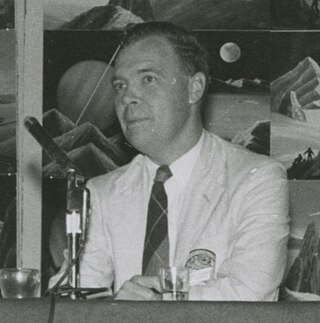
Harry Clement Stubbs, better known by the pen name Hal Clement, was an American science fiction writer and a leader of the hard science fiction subgenre. He also painted astronomically oriented artworks under the name George Richard.
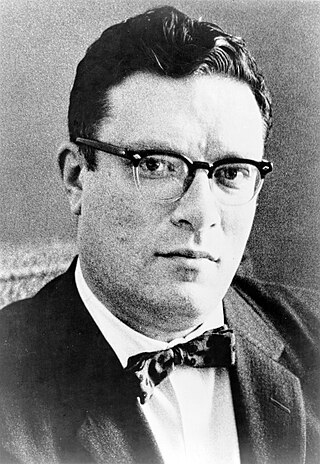
Isaac Asimov was an American writer and professor of biochemistry at Boston University. During his lifetime, Asimov was considered one of the "Big Three" science fiction writers, along with Robert A. Heinlein and Arthur C. Clarke. A prolific writer, he wrote or edited more than 500 books. He also wrote an estimated 90,000 letters and postcards. Best known for his hard science fiction, Asimov also wrote mysteries and fantasy, as well as popular science and other non-fiction.
Reginald Bretnor was an American science fiction author who flourished between the 1950s and 1980s. Most of his fiction was in short story form, and usually featured a whimsical story line or ironic plot twist. He also wrote on military theory and public affairs, and edited some of the earliest books to consider SF from a literary theory and criticism perspective.

Asimov's Science Fiction is an American science fiction magazine edited by Sheila Williams and published by Dell Magazines, which is owned by Penny Press. It was launched as a quarterly by Davis Publications in 1977, after obtaining Isaac Asimov's consent for the use of his name. It was originally titled Isaac Asimov's Science Fiction Magazine, and was quickly successful, reaching a circulation of over 100,000 within a year, and switching to monthly publication within a couple of years. George H. Scithers, the first editor, published many new writers who went on to be successful in the genre. Scithers favored traditional stories without sex or obscenity; along with frequent humorous stories, this gave Asimov's a reputation for printing juvenile fiction, despite its success. Asimov was not part of the editorial team, but wrote editorials for the magazine.
This is a bibliography of the books written or edited by Isaac Asimov, arranged alphabetically. Asimov was a prolific author, and he engaged in many collaborations with other authors. This list may not yet be complete. The total number of books listed here is over 500. Asimov died in 1992 at age 72; a small number of his books were published posthumously.

A science fiction magazine is a publication that offers primarily science fiction, either in a hard-copy periodical format or on the Internet. Science fiction magazines traditionally featured speculative fiction in short story, novelette, novella or novel form, a format that continues into the present day. Many also contain editorials, book reviews or articles, and some also include stories in the fantasy and horror genres.
The Golden Age of Science Fiction, often identified in the United States as the years 1938–1946, was a period in which a number of foundational works of science fiction literature appeared. In the history of science fiction, the Golden Age follows the "pulp era" of the 1920s and 1930s, and precedes New Wave science fiction of the 1960s and 1970s. The 1950s are, in this scheme, a transitional period. Robert Silverberg, who came of age in the 1950s, saw that decade as the true Golden Age. According to historian Adam Roberts, "the phrase Golden Age valorises a particular sort of writing: 'Hard SF', linear narratives, heroes solving problems or countering threats in a space-opera or technological-adventure idiom."

NESFA Press is the publishing arm of the New England Science Fiction Association, Inc. The NESFA Press primarily produces three types of books:
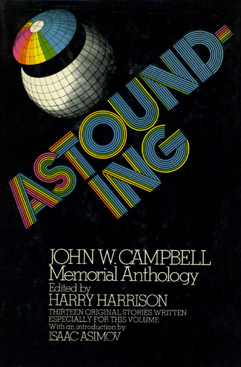
Astounding: John W. Campbell Memorial Anthology is a 1973 anthology honoring American science fiction and fantasy editor John W. Campbell, in the form of an anthology of short stories by various science fiction authors, edited by Harry Harrison. It was first published in hardcover by Random House as a selection of the Science Fiction Book Club, and first published in paperback by Ballantine Books.

Isaac Asimov Presents The Great SF Stories 4 (1942) is a science fiction anthology edited by Isaac Asimov and Martin H. Greenberg. It is the fourth volume of Isaac Asimov Presents The Great SF Stories, a series of short story collections that attempts to list the great science fiction stories from the Golden Age of Science Fiction. They date the Golden Age as beginning in 1939 and lasting until 1963. The book was later reprinted as the second half of Isaac Asimov Presents The Golden Years of Science Fiction, Second Series with the first half being Isaac Asimov Presents The Great SF Stories 3 (1941). This volume was originally published by DAW books in 1980.

Isaac Asimov Presents The Great SF Stories 25 (1963) is an American collection of science fiction stories, the last regular volume of the Isaac Asimov Presents The Great SF Stories series of short story collections, edited by Isaac Asimov and Martin H. Greenberg, which attempts to list the great science fiction stories from the Golden Age of Science Fiction. They date the Golden Age as beginning in 1939 and lasting until 1963. This volume was originally published by DAW books in July 1992.
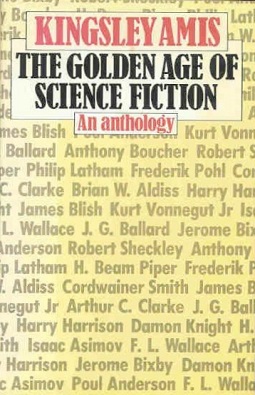
The Golden Age of Science Fiction is an anthology of science fiction short stories all originally published between 1949 and 1962. The stories were selected and introduced by Kingsley Amis, who also wrote an Editor's Note and a 21-page Introduction. The collection was first published by Hutchinson in 1981 and was released in paperback by Penguin in 1983.
Isaac's Universe is a fictional universe created by Isaac Asimov for other science fiction writers to use as a setting. It introduces the collaborative science fiction universe created by Asimov which eventually resulted in five volumes: three short story collections and two novels. It was initiated by Martin H. Greenberg, who also edited and published its three short stories collection by Avon Books starting in 1990.

Seekers of Tomorrow: Masters of Modern Science Fiction is a work of collective biography on the formative authors of the science fiction genre by Sam Moskowitz, first published in hardcover by the World Publishing Company in 1965. The first paperback edition was issued by Ballantine Books in October, 1967. A photographic reprint of the original edition was issued in both hardcover and trade paperback by Hyperion Press in 1974. Most of its chapters are revised versions of articles that initially appeared in the magazine Amazing Stories from 1961 to 1964.

Comet was a pulp magazine which published five issues from December 1940 to July 1941. It was edited by F. Orlin Tremaine, who had edited Astounding Stories, one of the leaders of the science fiction magazine field, for several years in the mid-1930s. Tremaine paid one cent per word, which was higher than some of the competing magazines, but the publisher, H-K Publications based in Springfield, MA, was unable to sustain the magazine while it gained circulation, and it was cancelled after less than a year when Tremaine resigned. Comet published fiction by several well-known and popular writers, including E.E. Smith and Robert Moore Williams. The young Isaac Asimov, visiting Tremaine in Comet's offices, was alarmed when Tremaine asserted that anyone who gave stories to competing magazines for no pay should be blacklisted; Asimov promptly insisted that Donald Wollheim, to whom he had given a free story, should make him a token payment so he could say he had been paid.
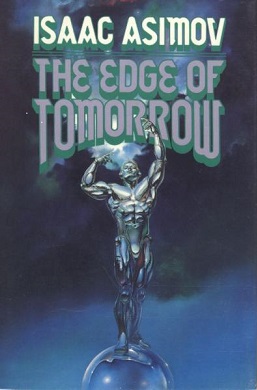
The Edge of Tomorrow is a collection of short science fiction stories and science essays by Isaac Asimov, published by Tor Books in July 1985.
In a writing career spanning 53 years (1939–1992), science fiction and popular science author Isaac Asimov (1920–1992) wrote and published 40 novels, 383 short stories, over 280 non-fiction books, and edited about 147 others.

Possible Worlds of Science Fiction is an anthology of science fiction short stories edited by American anthologist Groff Conklin. It was first published in hardcover by Vanguard Press in 1951. An abridged hardback version including thirteen of its twenty-two stories was published by Grayson & Grayson in 1952; an abridged paperback version including ten of its twenty-two stories was published by Berkley Books in July 1955 and reprinted in April 1956, November 1960, January 1962 and November 1968.
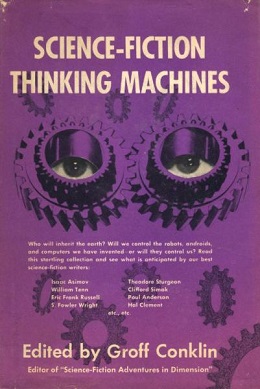
Science Fiction Thinking Machines: Robots, Androids, Computers is an anthology of science fiction short stories edited by American anthologist Groff Conklin. It was first published in hardcover by Vanguard Press in May 1954. An abridged paperback edition titled Selections from Science Fiction Thinking Machines was published by Bantam Books in August 1955 and reprinted in September 1964.

Analog: Writers' Choice, Volume II is the eighth in a series of anthologies of science fiction stories drawn from Analog magazine and edited by then-current Analog editor Stanley Schmidt. It was first published in paperback by Davis Publications and hardcover by The Dial Press in 1984.















